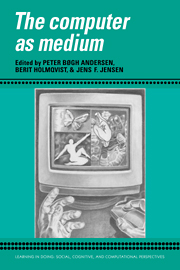Book contents
- Frontmatter
- Contents
- Series foreword
- Preface
- Contributors
- Part I Computer-based signs
- Part II The rhetoric of interactive media
- Introduction
- 6 Narrative computer systems: The dialectics of emotion and formalism
- 7 Interactive fiction: Artificial intelligence as a mode of sign production
- 8 Plays, theaters, and the art of acting in the eighteenth century: A formal analysis
- 9 The meaning of plot and narrative
- 10 Face to interface
- 11 Drawing and programming
- 12 Hypermedia communication and academic discourse: Some speculations on a future genre
- Part III Computers in context
- Index
8 - Plays, theaters, and the art of acting in the eighteenth century: A formal analysis
Published online by Cambridge University Press: 05 October 2010
- Frontmatter
- Contents
- Series foreword
- Preface
- Contributors
- Part I Computer-based signs
- Part II The rhetoric of interactive media
- Introduction
- 6 Narrative computer systems: The dialectics of emotion and formalism
- 7 Interactive fiction: Artificial intelligence as a mode of sign production
- 8 Plays, theaters, and the art of acting in the eighteenth century: A formal analysis
- 9 The meaning of plot and narrative
- 10 Face to interface
- 11 Drawing and programming
- 12 Hypermedia communication and academic discourse: Some speculations on a future genre
- Part III Computers in context
- Index
Summary
Profound changes have cut us off from the pre-bourgeois cultures. Indeed, the main criteria that are used to define European culture separate us from the culture of earlier periods. Changes set in at the beginning of the bourgeois period that were so radical and have since become so well-established that we often lose sight of the fact that they were the results of a historical development. I am thinking here of the dynamisation of culture that took place in the middle of the eighteenth century as a result of the beginning industrialisation in Europe. Literature, art and philosophy offer countless illustrations of the European time shock.
There were three main effects of this process of dynamization. First, the concept of personality was dynamized. Where previously individuals had been regarded in terms of their absolute relationship to God, they were now also seen in terms of their relationship to themselves. Where previously they had been regarded as members of a community, they were now regarded as separate elements subject to the laws of development. Secondl, society itself came to be regarded as dynamic; where previously it had been analyzed in terms of such concepts as change and modification, it was now understood on the basis of such concepts as transformation and development. And finally, nature came to be regarded as dynamic.
Such changes clearly complicate the way a culture views itself considerably. There is a tendency for cultural and literary critics to regard modern cultural and literary expressions as outpourings of regret that this dynamization took place.
- Type
- Chapter
- Information
- The Computer as Medium , pp. 186 - 208Publisher: Cambridge University PressPrint publication year: 1994



